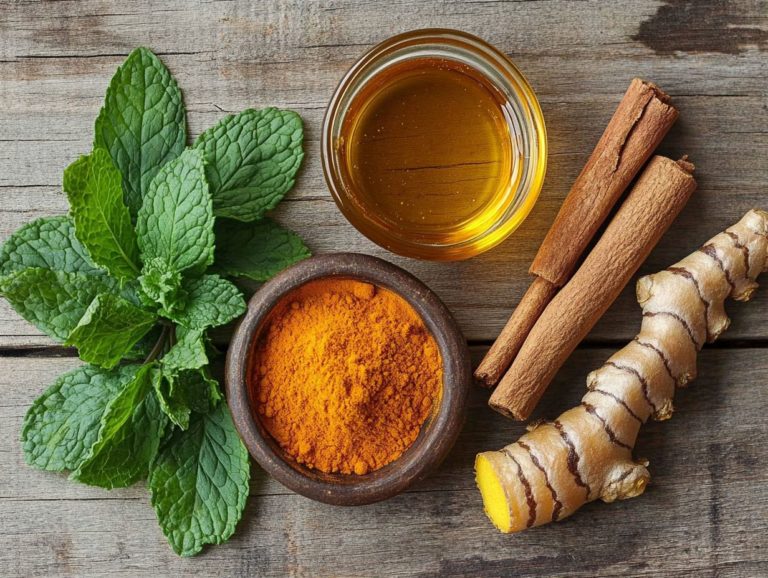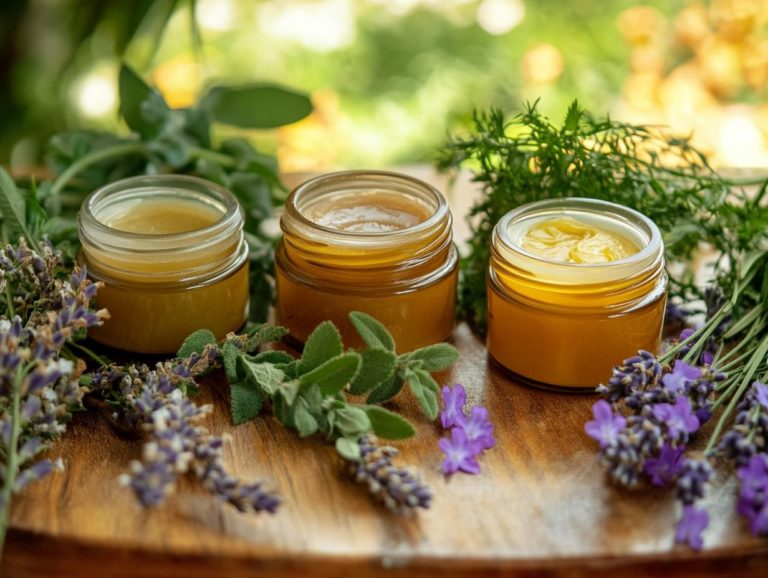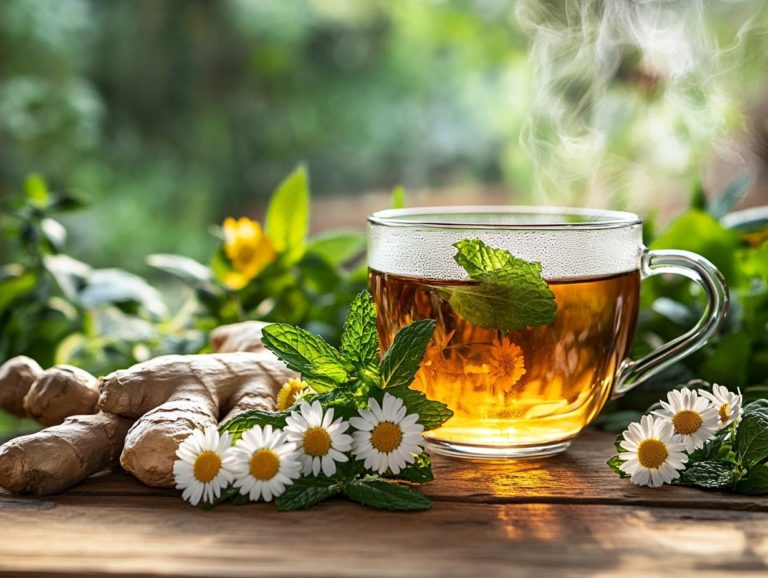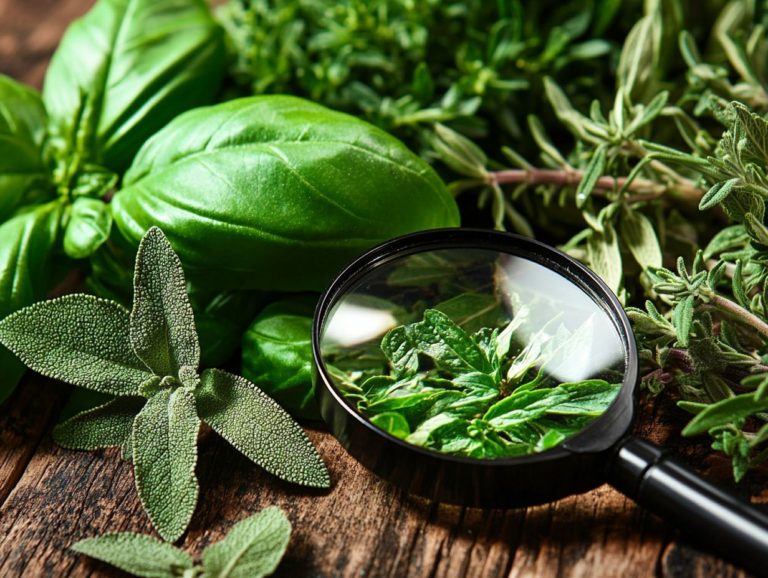What Is the History of Herbal Medicine?
Herbal medicine boasts a rich history that stretches back centuries. It is grounded in humanity’s earliest efforts to harness the healing properties of plants.
From the ancient civilizations of Egypt, China, and India to the vital contributions of monasteries during the Middle Ages, the journey of herbal remedies illustrates our evolving comprehension of health and wellness. It highlights the importance of traditional knowledge.
Today, as modern science combines with these traditional practices, the resurgence of herbal medicine ignites both enthusiasm and debate. Discover how this ancient practice is making a comeback today!
Contents
- Key Takeaways:
- Origins of Herbal Medicine
- Herbal Medicine in Ancient Civilizations
- Herbal Medicine in the Middle Ages
- Revival of Herbal Medicine in the Modern Era
- Frequently Asked Questions
- What Is the History of Herbal Medicine and Ancient Herbalism?
- How Did Herbal Medicine Develop Over Time?
- What Role Did Herbal Medicine Play in Ancient Civilizations?
- How Has the Use of Herbal Medicine Changed in Modern Times?
- What Are Some Famous Herbal Medicines in History?
- What Are the Benefits of Herbal Medicine?
Key Takeaways:
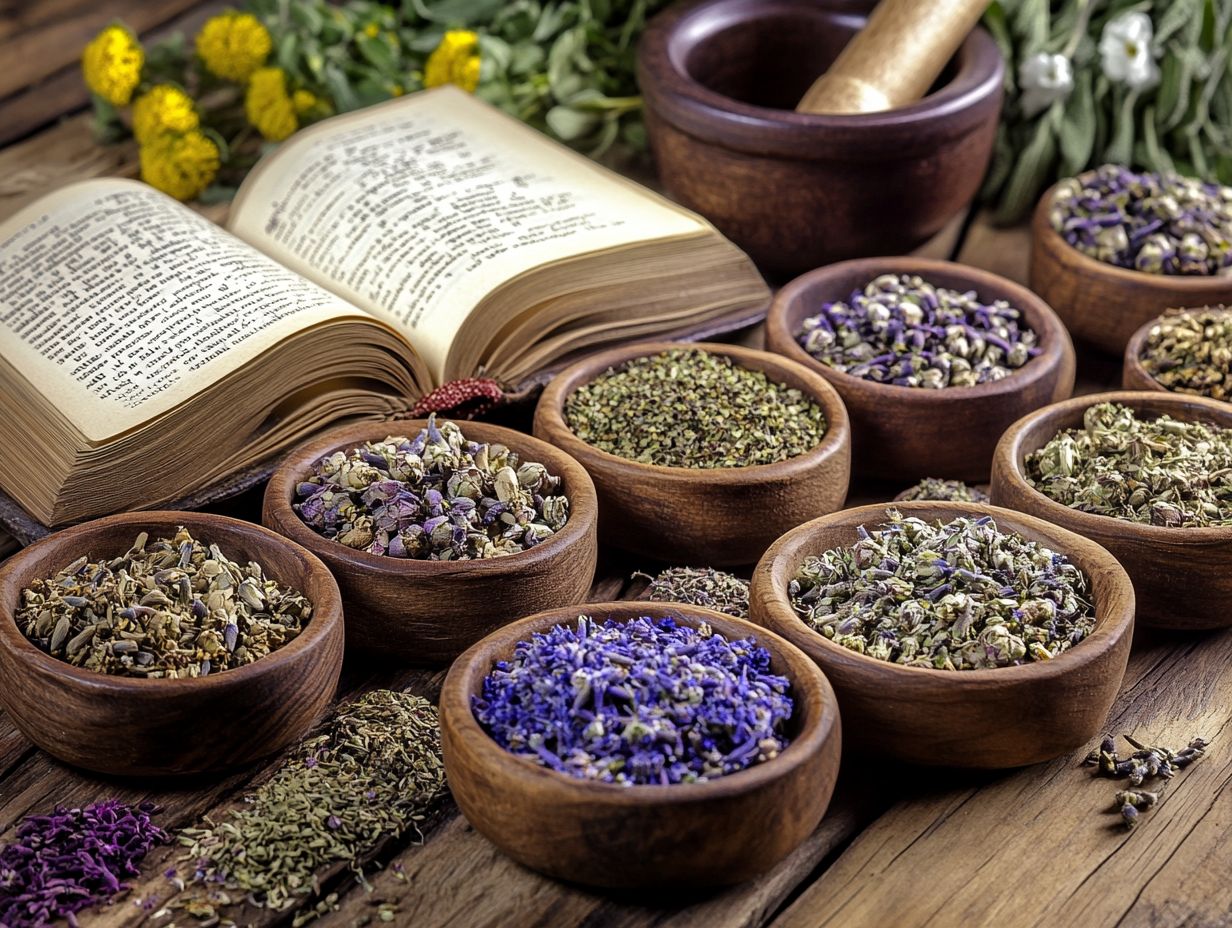
- Herbs have been used for medicinal purposes since ancient times. Early societies relied on plants for healing, leading to the development of traditional herbal medicine systems.
- Ancient civilizations like Egypt, China, and India have rich traditions of incorporating herbs into their medical practices.
- Herbal medicine experienced a revival in the modern era. Scientific advances have influenced its development and the current trends and controversies surrounding its use.
Origins of Herbal Medicine
The origins of herbal medicine trace back to ancient civilizations. Healing herbs and medicinal plants served as natural remedies for many ailments.
This established the foundation for traditional knowledge and practices that endure to this day. Ancient herbalism created a rich tapestry of healing traditions that mix diverse cultures.
These traditions show how powerful botanical wellness can be. From this historical context, modern herbal therapies have blossomed, connecting us to a time-honored legacy of healing.
Early Uses of Plants for Healing
Early cultures valued healing herbs and medicinal plants as powerful natural remedies. They documented these practices in ancient texts and incorporated them into healing rituals.
In places like the fertile banks of the Nile, the Ebers Papyrus detailed a variety of herbal applications. In ancient China, the Shennong Ben Cao Jing praised tonics like Ginseng for their health benefits.
These early societies understood the profound influence of nature on well-being. Ginger, often celebrated for its warming properties, has been a staple in Ayurvedic practices to ease digestive issues.
Similarly, Turmeric has been trusted in Indian culture for its anti-inflammatory qualities. These plants were not just remedies; they played a vital role in holistic health.
They link the wisdom of the ancients with today s renewed fascination with natural medicine and the plant-based medicine approach.
Development of Traditional Herbal Medicine Systems
The development of traditional herbal medicine systems, such as Ayurvedic healing and Traditional Chinese Medicine, showcases the rich cultural traditions that have shaped herbalism practices. These systems have gone through centuries of evolution.
Each offers unique approaches shaped by their historical contexts and scientific understanding. In Ayurvedic healing, the emphasis lies on balancing bodily energies.
This system employs a diverse array of therapeutic ingredients, including herbs, minerals, and oils. Meanwhile, Traditional Chinese Medicine focuses on the flow of qi, or life energy.
It utilizes holistic methods that blend herbs like ginseng, licorice, and various fungi to restore harmony within the body. This intricate tapestry of herbal science reflects the values and philosophies embedded in these cultures.
It also stands as a testament to the enduring wisdom of natural healing practices and their ongoing relevance in modern medicine.
Herbal Medicine in Ancient Civilizations
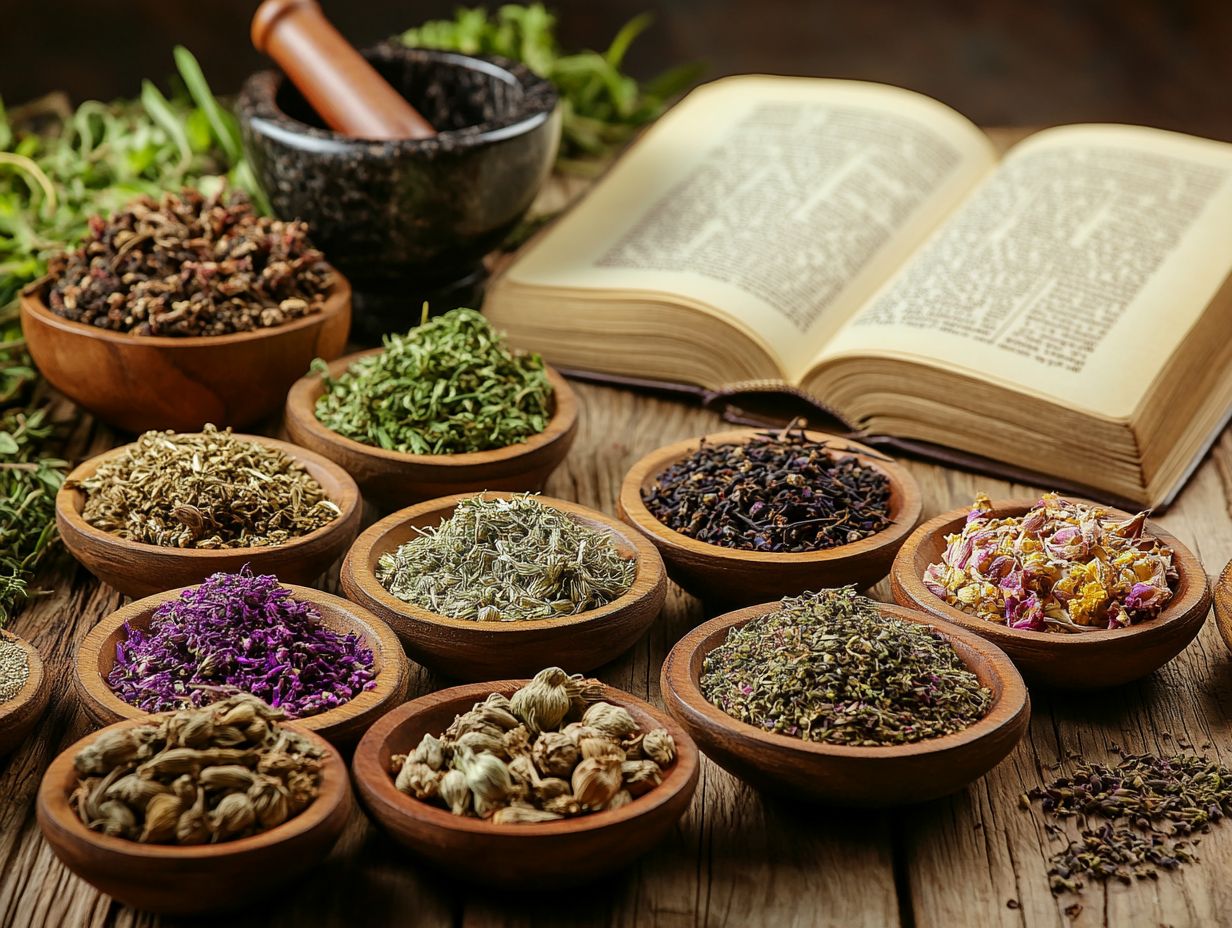
Herbal medicine has been important in ancient cultures, where the traditions of Egypt, China, and India celebrated the power of healing herbs and medicinal plants. These cultures showcased the traditions that shaped their practices.
This history not only shaped their cultures but also laid the groundwork for significant herbal discoveries that continue to influence modern practices and evidence-based medicine.
Egyptian, Chinese, and Indian Traditions
Egyptian herbal medicine, Chinese medicine, and Indian herbal traditions each offer distinctive healing systems. These highlight the diverse applications of healing herbs, woven into daily life and documented in ancient texts.
These traditions show both the practical uses of herbs and a deep understanding of their healing properties. For instance, ancient Egyptian texts unveil the extensive use of Aloe, revered for its soothing qualities. Chinese medicine underscores the importance of Elderberry in enhancing vitality, while Indian Ayurvedic practices, a traditional system of medicine in India, embrace Chamomile, celebrated for its calming effects.
Each culture s history is interlaced with a deep respect for nature s remedies, illustrating how generations depended on these potent plants for health and well-being.
Herbal Medicine in the Middle Ages
During the Middle Ages, the landscape of herbal medicine was influenced by the contributions of monasteries and physicians. These guardians of knowledge meticulously documented their findings and engaged in community health practices. They played a crucial role in preserving and expanding herbal wisdom.
Their efforts ensured that these healing traditions not only survived but thrived throughout the ages.
Role of Monasteries and Physicians
Monasteries and physicians played a pivotal role in the history of herbal medicine by serving as centers of herbal education. Here, herbalists cultivated their knowledge and shared it with the community, promoting health and wellness.
These institutions transformed into vibrant hubs of learning and discovery. Individuals could develop a profound understanding of plants and their medicinal properties. Monasteries kept careful records of herbal remedies and treatments. They shared this knowledge with local communities.
Physicians, often trained by these wise monks, harnessed their expertise to address ailments through a thoughtful blend of prayer and herbal medicine. The soothing properties of chamomile and the immune-boosting benefits of echinacea were frequently highlighted in texts, underscoring their significance in daily health practices.
This collaboration between monks and physicians enriched herbal education and strengthened community health, making natural remedies accessible to all.
Revival of Herbal Medicine in the Modern Era
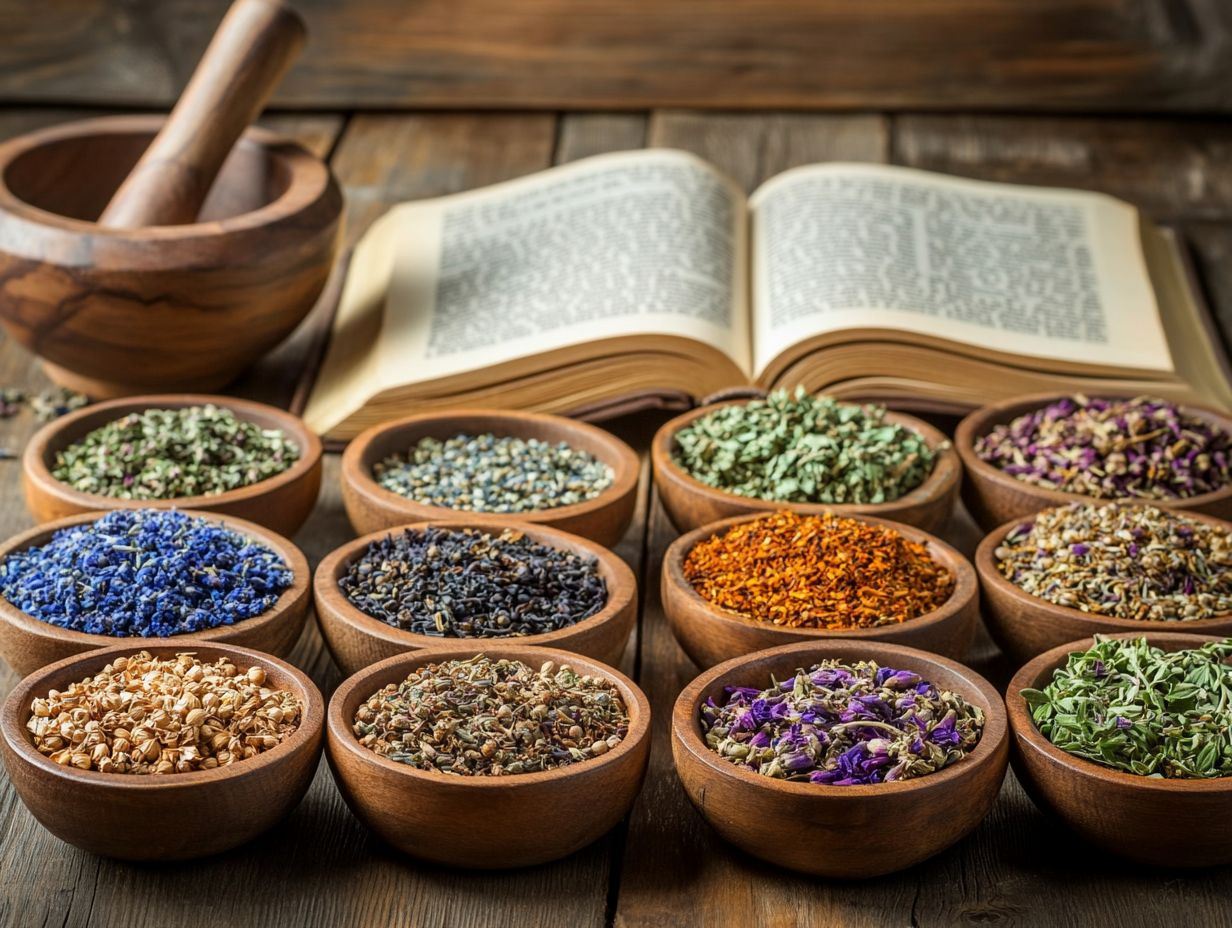
The resurgence of herbal medicine today has been invigorated by scientific advancements that confirm the effectiveness of various herbal products. This development seamlessly connects traditional practices with contemporary medicine, paving the way for new herbal discoveries.
Influence of Scientific Advances
Scientific advances have transformed our understanding of herbal discoveries. They pave the way for integrating herbal science into evidence-based practices in modern medicine.
This evolution opens new avenues for research and validates traditional treatments. It’s gaining traction among healthcare professionals.
For instance, the discovery of Artemisinin, derived from the sweet wormwood plant, exemplifies how rigorous scientific inquiry can reveal remarkable health benefits.
Initially used in traditional Chinese medicine, its documented efficacy against malaria underscores the crucial role that herbs play in contemporary medical strategies.
Researchers are delving deeper into herbal compounds. Their findings are reshaping perceptions and promoting a blend of conventional and alternative therapies, ultimately fostering a more comprehensive approach to patient care and encouraging the herbal community.
Current Trends and Controversies
Current trends in herbal medicine showcase a mix of acceptance and controversy. Integrating herbal therapies into established healthcare systems while addressing community health needs poses challenges regarding herbal effectiveness.
As more individuals gravitate toward natural alternatives to pharmaceuticals, the allure of herbal remedies has intensified. This ignites debates among healthcare professionals about their efficacy and safety.
You may find yourself at the heart of discussions surrounding the regulatory challenges that restrict the wider acceptance of herbal products.
While some mainstream medical circles embrace certain herbal treatments, skepticism remains, particularly regarding the standardization and quality control of these products.
In this complex environment, you play a pivotal role in guiding your community. Educating them about the benefits and risks associated with herbal use fosters a deeper understanding of holistic approaches to wellness.
Frequently Asked Questions
What Is the History of Herbal Medicine and Ancient Herbalism?
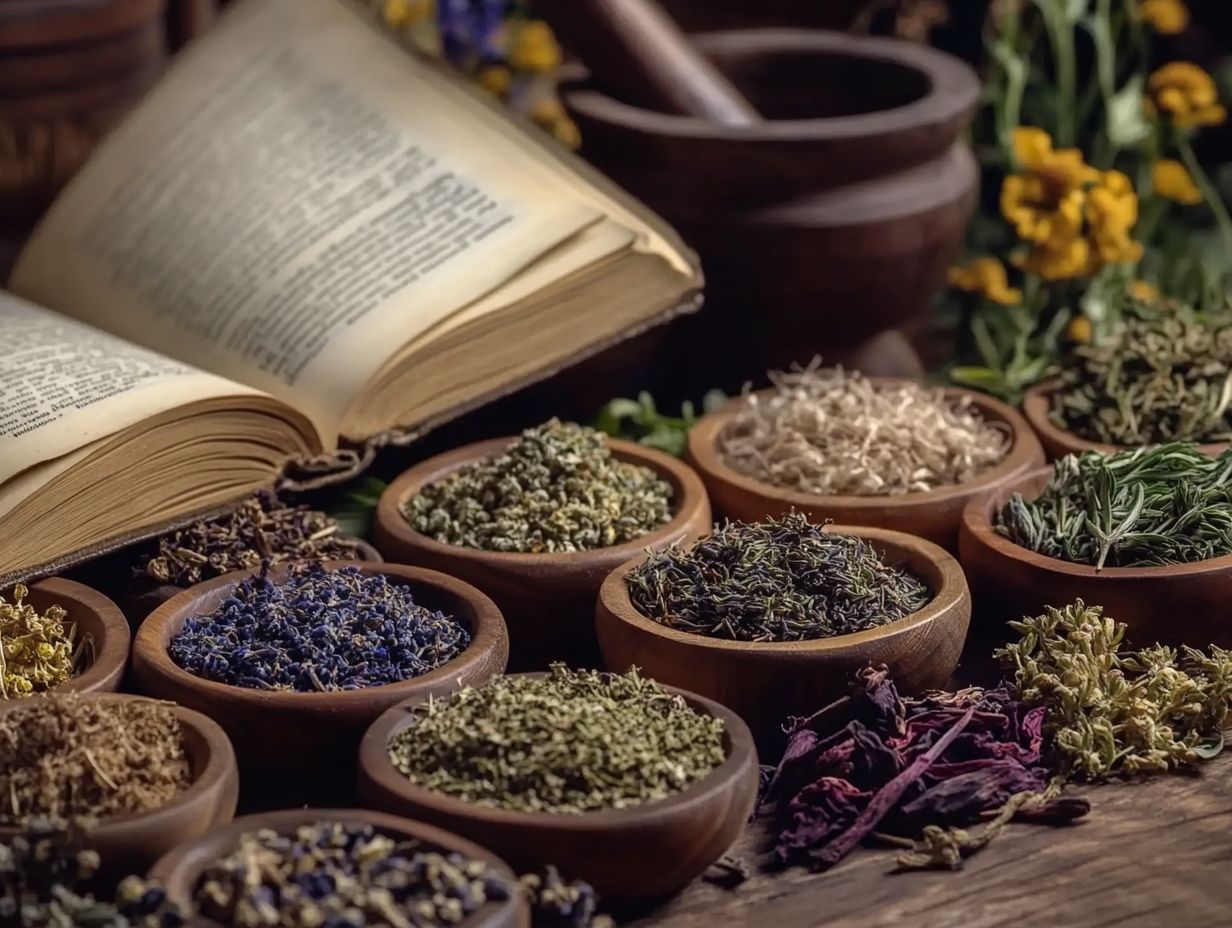
The history of herbal medicine dates back to ancient civilizations. Medicinal plants were used for various ailments 60,000 years ago.
How Did Herbal Medicine Develop Over Time?
Herbal medicine has evolved as different cultures discovered and shared their knowledge about the healing properties of plants. It has been influenced by traditional knowledge and modern research.
What Role Did Herbal Medicine Play in Ancient Civilizations?
In ancient civilizations such as Egypt, China, and India, herbal medicine played a significant role in healing. Traditions like Ayurvedic healing and Chinese medicine were often the primary forms of medicine. Many ancient texts, such as the Ebers Papyrus, documented the use of medicinal herbs for healing rituals.
How Has the Use of Herbal Medicine Changed in Modern Times?
In modern times, the use of herbal medicine has become more widespread and accepted. Many people are turning to natural remedies for their health concerns. It has also become more regulated and standardized, with evidence-based practices being formalized.
What Are Some Famous Herbal Medicines in History?
Some famous herbal medicines in history include traditional Chinese medicine, Ayurveda in India, and Native American herbal medicine. Each represents unique cultural traditions and herbal applications. These practices, along with contributions from herbalists like George Washington Carver and Harriet Tubman, have been passed down for generations and remain widely used today.
What Are the Benefits of Herbal Medicine?
Discover how herbal medicine can transform your health! This approach offers a wide range of benefits, including treating and preventing various illnesses through natural therapies.
Herbal medicine promotes overall well-being and often has fewer side effects than pharmaceutical drugs. It is also rooted in the historical use of herbs and is frequently more affordable than traditional medicine.

